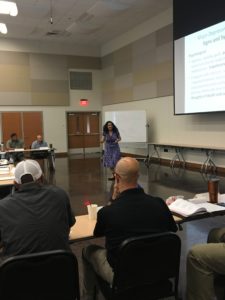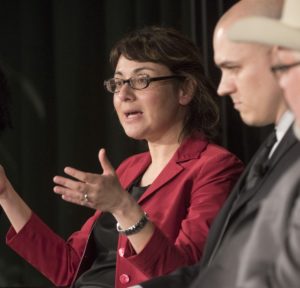TRANSPARENCIES
a monthly newsletter from Integral Care
a monthly newsletter from Integral Care

A Message From Our CEO
The 86th Texas Legislative Session has come to a close with over 4,500 bills and resolutions passed. Legislators came together, strong in their bipartisan commitment to various issue areas including mental health, substance use disorder and intellectual and developmental disabilities (IDD).

Integral Care’s Julie Guirguis training AISD staff in Mental Health First Aid
Prior to this session, school safety was a major issue during the interim. Governor Abbott’s School and Firearm Safety Action Plan called for improving mental and behavioral health systems in our schools, with a focus on increasing Mental Health First Aid (MHFA), providing schools with behavioral threat assessment programs and expanding school-based counseling resources.
In line with the Governor’s initiative, the session saw many advancements in this area. Legislation passed that aims to provide MHFA training to more school staff in order to increase awareness and understanding of mental health and co-occurring substance use disorders. Both the Texas Child Mental Health Care Consortium and Collaborative Task Force on Public School Mental Health Services were created out of this session to promote mental health in public schools, as well as evaluate the effectiveness of state-funded school mental health services.
Legislators recognized the negative impact of prior cuts to programs from last session and committed themselves to addressing Early Childhood Intervention (ECI), IDD and insurance reimbursement rates through Managed Care Organizations. ECI, which has seen a decrease in funding over the last several years, received a $52 million increase compared to the previous two-year budget. Legislators allocated $25 million to IDD Community Care waiver slots for diversion and transition of individuals from institutional settings and reducing interest lists. Advancements were made to ensure parity regarding telemedicine, guaranteeing that telehealth services are reimbursed on the same basis as an in-person service.

Early Childhood Intervention session with Integral Care provider
Substance use disorder services saw a major advancement with a change to licensure requirements. The change increases access by allowing licensed outpatient drug and alcohol treatment providers to operate secondary or satellite services in communities where it may not be economically viable to open, maintain and operate separately licensed facilities. This will reduce barriers for providers and help integrate mental health services with drug and alcohol treatment, particularly in rural areas.
Criminal Justice was an area that saw growth this session, with increased mental health services in jails, mental health civil commitment reform and opportunities for Local Mental Health Authorities to improve the accuracy of information collected about individuals with mental illness in the criminal justice system.
 The legislature provided $165 million for this biennium to construct the first phase of the Austin State Hospital (ASH). In 2017, the Legislature directed the Texas Health and Human Services Commission to develop the Comprehensive Inpatient Mental Health Plan, which provided a six-year framework for rebuilding five of the ten psychiatric hospitals. Senator Kirk Watson, who has been leading the charge for the ASH redesign, said, “This is a big win in our efforts to transform the ASH Brain Health System and demonstrates the Legislature’s commitment to improving access to quality mental health care for all Texans.”
The legislature provided $165 million for this biennium to construct the first phase of the Austin State Hospital (ASH). In 2017, the Legislature directed the Texas Health and Human Services Commission to develop the Comprehensive Inpatient Mental Health Plan, which provided a six-year framework for rebuilding five of the ten psychiatric hospitals. Senator Kirk Watson, who has been leading the charge for the ASH redesign, said, “This is a big win in our efforts to transform the ASH Brain Health System and demonstrates the Legislature’s commitment to improving access to quality mental health care for all Texans.”
The new 3.5% caps on local taxes will be challenging to communities, despite the exemptions made for community colleges and hospital districts. Currently, 70% of City of Austin and Travis County budgets are made up of emergency services including funding for police officers, sheriff deputies, EMS services, and firefighters. Tax caps will take effect in fall 2020, and local governments will have to make tough choices about how to allocate limited resources.
View Integral Care’s full end of session report, detailing legislation passed in various issue areas around behavioral health and IDD. We appreciate all of the hard work and dedication of the Representatives, Senators and legislative staff who helped strengthen access to services that support healthy living for everyone in Texas.

David Evans
Chief Executive Officer
Health Heroes This Session
We’d like to recognize the strong leaders who prioritized mental health, substance use disorder and intellectual and developmental disabilities (IDD) this legislative session.

Photo credit: senate.texas.gov
State Senator Judith Zaffirini is an expert in health and human services policy and funding and advocates for improved health services for all Texans. This session, Senator Zaffirini authored and passed Senate Bill 562, a valuable criminal justice bill reducing wait times in determining adequate treatment settings for individuals involved in the criminal justice system. She also authored and passed important Veterans legislation, Senate Bill 2104, creating the Texas Veterans County Service Officer Task Force to study the impact and efficacy of Veteran County Service Officers (VCSOs). VCSOs assist veterans with accessing benefits and services including health care, employment and compensation. She continued her efforts by sponsoring House Bill 4298, a licensure bill that passed, which increases access to substance use services by allowing providers to operate satellite services in communities where it may not be economically viable to open, maintain and operate separate licensed facilities. Additionally, Senator Zaffirini sponsored enacted legislation that increases the accuracy of information collected about individuals experiencing mental illness who are involved in the criminal justice system, requiring person-first language in the Education Code for individuals with IDD and ensuring specialty court reporting efficiency while ensuring proper oversight.

Photo credit: LBJ Library
Representative Gina Hinojosa serves as Vice Chair of the House Human Services Committee, overseeing the Health and Human Services Commission. Through Representative Hinojosa’s passion and leadership in advocating to remove barriers to healthcare access, she authored legislation that will help improve the lives of Texans statewide. Representative Hinojosa authored and passed House Bill 3193, which increases the length of time from two years to three years, for which a home and community support services license is valid. This legislation helps align the licensing period for home and community support services with other long-term care providers. Representative Hinojosa sponsored Senate Bill 1350, which passed, authorizing the Travis County Healthcare District (Central Health) to establish and operate a “local provider participation program.” This will allow millions in federal dollars to be pulled down to pay for healthcare in Travis County.

Photo credit: senate.texas.gov
Senator Donna Campbell serves on the Senate Health and Human Services Committee and chairs the Senate Veteran Affairs and Border Security Committee. This session, Senator Campbell sponsored House Bill 4455, parity legislation that passed, requiring health benefit plans to provide coverage for telemedicine or telehealth services on the same basis as coverage for an in-person service. (Telemedicine has expanded rapidly in Texas due to the growing shortage of healthcare providers.) Senator Campbell also authored and passed Senate Bill 1200, otherwise known as the Support for Military Spouses Act, a top legislative priority for her this session. The bill allows military spouses who have occupational licenses in good standing from another state to quickly begin working in Texas.
“Military families stationed in Texas shouldn’t be kept waiting on an income because of bureaucratic red tape and burdensome state licensing requirements. The Support for Military Spouses Act ensures that if the spouse of a service member has a valid occupational license from another state that they can begin to work in their field immediately. This is a win-win for our workforce and our military families.” – Senator Campbell
Thank you to all of our legislators who advocated for behavioral health and IDD services, awareness and support. You are instrumental in building health and well-being for all Texans.
June: Strengthening Access for Veterans and the Entire Military Family
May: Women and Mental Health
April: Legislative Session Status Report
March 2019: Making Opportunities for Recovery More Accessible
February 2019: Recovery is Possible
January 2019: Stronger Outcomes Through Collaboration
December 2018: Looking ahead to the 86th Texas Legislature
November 2018: How Tech is Changing the Face of Mental Health
October 2018: A Few Questions Could Help Save a Life
September 2018: Anyone Can Save a Life
August 2018: A Milestone Moment
July 2018: Equity in Mental Health Care for All
June 2018: Expanding Services for Veterans
May 2018: Your Mental Health Toolkit
April 2018: Time of Terror Calls for Increased Emotional Support
March 2018: Stopping the cycle of incarceration for individuals with mental illness
February 2018: Equity in mental healthcare for everyone
January 2018 : Improving Mental Health Through Partnership & Collaboration
December 2017: Strength Through Community
November 2017 : Healthy Lifestyles Improve Well-Being
October 2017 : National Child Health Day
September 2017 : Strengthening Families and Communities